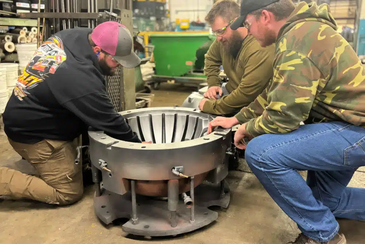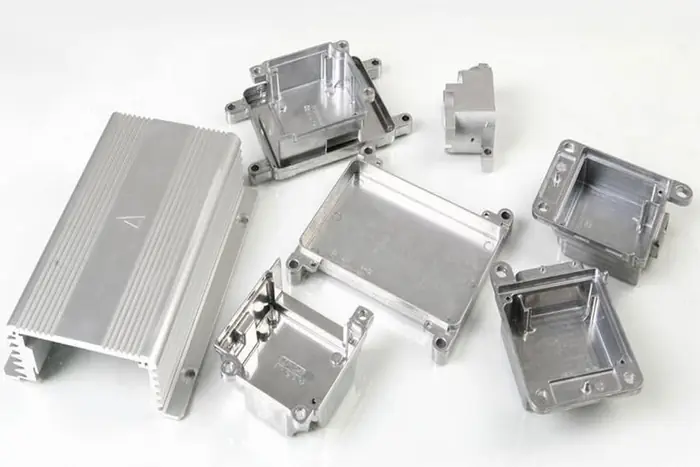Just How Factory Solutions Enhance Manufacturing Efficiency and Quality in Industrial Applications
Foundry solutions play a necessary duty in improving manufacturing effectiveness and top quality across numerous commercial applications. By applying advanced metal casting methods, these services guarantee elements are made with accuracy and uniformity. This not only decreases lead times yet also reduces waste, promoting better partnership in between producers and shops. The influence of top notch elements on functional performance raises crucial concerns about the future of commercial manufacturing. What advancements lie ahead in this evolving landscape?
The Function of Foundry Providers in Streamlining Production Processes

Foundries usually give know-how in alloy development, enabling makers to make use of innovative materials that boost product performance. The collaboration in between suppliers and factories fosters a far better understanding of manufacturing demands, resulting in optimized processes and boosted item styles. By leveraging foundry services, producers can accomplish greater adaptability, adapt to altering market demands, and keep competitiveness in the sector. Overall, the function of factory solutions is crucial in assisting in a much more cost-efficient and reliable production landscape.
Advanced Technologies in Factory Workflow
Ingenious technologies are changing foundry procedures, considerably boosting performance and precision. Automation plays a crucial role, with robotic systems enhancing recurring tasks such as molding and product handling. Additionally, improvements in computer-aided layout (CAD) and computer-aided manufacturing (CAM) systems enable foundries to develop complicated geometries with greater precision and minimized material waste.
The integration of artificial knowledge (AI) and machine knowing enhances top quality control by checking procedures in real-time and anticipating potential flaws before they take place. Making use of sophisticated products, such as lightweight alloys and compounds, additionally enhances the performance qualities of actors products.
3D printing technology is changing prototyping and tooling, enabling for fast modification and minimized lead times. Collectively, these innovative technologies not only boost manufacturing effectiveness yet also ensure that the final items fulfill rigid high quality criteria, positioning foundries at the leading edge of modern-day commercial applications.
Lowering Lead Times Through Effective Shop Practices
Efficient foundry practices play an important duty in lessening preparations within manufacturing settings. By executing streamlined manufacturing processes and advanced organizing strategies, suppliers can improve operations and maximize source appropriation. These improvements not just speed up outcome but likewise add to overall operational efficiency.
Structured Manufacturing Procedures
Improving production procedures is necessary for minimizing lead times in the manufacturing field. Effective foundry methods, consisting of optimized workflows and source monitoring, play a crucial role in accomplishing this objective. By decreasing waste and enhancing interaction among groups, foundries can greatly improve their operational effectiveness. The implementation of standardized procedures additionally contributes to constant high quality and faster turn-around times, making it possible for manufacturers to respond even more swiftly to market needs. Additionally, the assimilation of sophisticated technologies, such as automation and real-time monitoring systems, assists in identifying traffic jams and assisting in prompt interventions. On the whole, a concentrate on structured manufacturing processes not only accelerates lead times but additionally improves the general competition of commercial applications, guaranteeing that items fulfill consumer assumptions effectively.
Advanced Scheduling Techniques
Reliable production processes naturally lead makers to explore sophisticated organizing methods as a method to further lower lead times. By utilizing innovative formulas and software program, foundries can optimize workflows, straightening manufacturing timetables with need my review here forecasts and source availability. Strategies such as Just-In-Time (JIT) scheduling decrease stock costs while guaranteeing timely material delivery, consequently enhancing functional efficiency. Furthermore, incorporating real-time information analytics allows foundries to expect prospective delays and change schedules proactively. This flexibility not only streamlines procedures yet also increases total efficiency. Collaborative planning with suppliers and consumers can promote an extra integrated supply chain, further lowering lead times. Eventually, these sophisticated scheduling methods equip foundries to achieve greater efficiency and premium high quality in their production procedures.
Ensuring Accuracy and Top Quality in Steel Casting
Guaranteeing accuracy and top quality in metal casting calls for a meticulous technique that incorporates every phase of the manufacturing procedure. This procedure starts with cautious style and engineering of the mold and mildews, assuring they can endure the molten steel's temperature level and stress. The selection of top quality basic materials is vital, as impurities can jeopardize the final product.
As soon as the products are prepared, exact temperature control during melting and pouring is essential to accomplish the preferred properties in the actors steel. Checking solidification and air conditioning prices additional guarantees dimensional precision and surface area finish.
Quality control methods, such as non-destructive testing and examination, are vital to identifying problems early while doing so. aluminum casting. In addition, employing competent workers who recognize the nuances of steel casting adds significantly to maintaining high requirements. In general, these techniques collectively boost the integrity and performance of cast elements in numerous commercial applications
Decreasing Waste and Maximizing Source Use

Additionally, recycling scrap metal within the foundry itself can substantially lower waste, changing byproducts right into useful sources. Lean making concepts likewise contribute to squander reduction by enhancing procedures and eliminating unneeded steps, causing much more effective procedures.
In addition, that site normal upkeep of devices warranties peak efficiency, protecting against breakdowns that can cause squandered products. By concentrating on these techniques, foundries not only minimize prices but also add to lasting methods, lining up with the expanding need for environmentally liable manufacturing techniques in commercial applications.
The Competitive Benefit of High-Quality Components on the market
Top quality components give a substantial competitive advantage in the factory market, where accuracy and toughness are critical. Manufacturers that focus on remarkable products and workmanship can improve item performance and integrity, resulting in enhanced consumer contentment. This benefit is specifically noticeable in markets such as automotive and aerospace, where element failure can have tragic repercussions.
Premium components usually result in lower upkeep prices and extended product life expectancies, which can be enticing marketing factors for potential clients. As click here to read market demands expand for reliable and lasting innovations, the focus on quality ends up being also extra crucial. Companies that buy top notch shop services not just boost their production processes but likewise differentiate themselves from rivals that might sacrifice high quality for expense financial savings. Consequently, the commitment to high-grade elements inevitably translates into a more powerful market position and long-term company success.
Regularly Asked Questions
What Types of Products Do Shop Provider Usually Deal With?
Foundry solutions normally function with metals such as aluminum, steel, iron, and brass, in addition to numerous alloys. They additionally handle materials like compounds and porcelains, accommodating varied commercial demands and requirements in producing processes.
Exactly How Do Shop Solutions Impact Overall Supply Chain Monitoring?
Foundry services greatly boost supply chain management by enhancing product sourcing, lowering lead times, and making certain consistent top quality. Their capacity to offer tailored services promotes collaboration amongst stakeholders, eventually improving general functional efficiency and responsiveness in manufacturing.
What Industries Benefit Many From Shop Solutions?
Industries such as auto, aerospace, consumer, and construction products substantially take advantage of foundry services. These markets depend on precision spreadings to meet rigid quality requirements and enhance their total manufacturing procedures and item efficiency.
Are Shop Services Environmentally friendly and lasting?
Foundry solutions can be eco friendly and lasting, specifically when employing sophisticated technologies and procedures - aluminum casting. Innovations such as recycling materials, minimizing discharges, and maximizing power usage add to reducing their environmental effect in commercial applications

Exactly How Can Firms Select the Right Shop Provider?
Firms can select the ideal factory company by evaluating competence, manufacturing capabilities, high quality accreditations, innovation used, customer reviews, and sustainability techniques while ensuring placement with their particular task needs and long-lasting company objectives.
Factory solutions play a crucial function in improving manufacturing effectiveness and quality across different commercial applications. The cooperation between foundries and producers promotes a much better understanding of production demands, leading to enhanced procedures and enhanced item styles. Efficient shop techniques play an important duty in reducing lead times within production atmospheres. By employing advanced formulas and software program, foundries can enhance operations, lining up production schedules with demand forecasts and source schedule. Firms that invest in high-quality factory solutions not just improve their manufacturing procedures however also distinguish themselves from competitors who may compromise quality for expense financial savings.